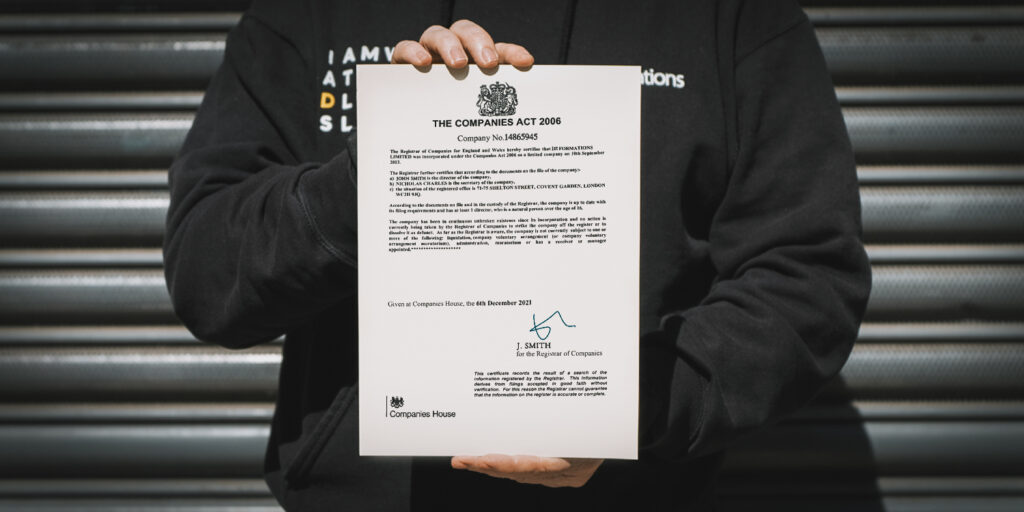The UK is a fantastic place to do business, which is why so many companies from across the globe choose to trade here. Likewise, there are some amazing opportunities for UK limited companies keen on taking their own goods and services to new markets overseas.
To trade in other countries, a UK company will often need to provide a Certificate of Good Standing (COGS) to overseas regulators.
In this guide, we explain everything you need to know about the Certificate of Good Standing. Below, you will find out what one is, why you’d need one, and how to request one.
Key Takeaways
- Businesses often need a Certificate of Good Standing when trading internationally, opening overseas bank accounts, or proving credibility to lenders, clients, and investors.
- To get a COGS, a private company must be up to date with filings and have at least one director who is human (i.e. not another company).
- The certificate is valid for 3 months and may require an apostille for use in foreign jurisdictions.
What is a Certificate of Good Standing?
A Certificate of Good Standing is an official document issued by Companies House, the UK Government’s official registrar of companies.
It verifies your limited company is in ‘good standing’ with Companies House, which tells third parties your company has been in continuous, uninterrupted existence since incorporation, and no action is being taken to strike your company off the register.
It also serves as official confirmation that a company is fully compliant with its legal obligations under the Companies Act. This includes meeting all statutory filing requirements, such as submitting annual accounts and confirmation statements on time, as well as paying all necessary fees and charges.
Why would you need one?
There are several key reasons a limited company would request a Certificate of Good Standing.
International trade and expansion
One of the most common reasons for requesting a COGS is when expanding into foreign markets. If a UK company wants to trade overseas, it will need to submit a COGS to the local equivalent of Companies House as part of the registration process to make its UK-based business legally recognised in the new jurisdiction.
Additionally, many international banks require a COGS before allowing a UK company to open an overseas business bank account. This reassures the financial institution that the company fully complies with UK regulations and poses no risk of fraudulent activity or insolvency.
Financial transactions and investment
Venture capital firms and other financial institutions may request a COGS as part of their due diligence process before agreeing to provide a company funding. Similarly, if a company applies for a business loan or other forms of credit, banks and credit providers may ask for a COGS as supporting evidence of the business’s credibility. This is particularly relevant for startups and small businesses that may not have an extensive trading history.
Government contracts and regulatory compliance
Businesses bidding for UK government contracts or applying for certain regulatory licences may also need to provide a Certificate of Good Standing. Public sector procurement processes are strict and often involve demonstrating full compliance with the law.
For example, a company applying for a government grant or seeking approval from regulatory bodies such as the Financial Conduct Authority (FCA) may need to submit a COGS as part of its application.
Building trust with clients and business partners
In some cases, companies may request a COGS to provide reassurance to key stakeholders, such as major clients or business partners. If a company is entering into a high-value contract or a long-term partnership, the other party may request a Certificate of Good Standing as proof that the company is stable and compliant with UK regulations.
What information is provided on a Certificate of Good Standing?
Before asking for a Certificate of Good Standing, it’s important you understand the information it will include.
A Certificate of Good Standing contains the following information about a company:
- Directors’ names and other details, such as dates of birth and nationalities
- Company secretaries’ names (if applicable)
- Registered office address
- Date of incorporation
- Verification that the company is up to date with its statutory filing requirements
- Company’s objects (if applicable)
- Summary statement (previously known as the good standing statement)
The summary statement will confirm that the company ‘has been in continuous, unbroken existence since its incorporation and that no action is currently being taken to strike the company off the register’.
It’s important to note you can’t request a COGS with details of people with significant control (PSCs), shareholders, shares, or the statement of capital.
If you need to provide proof of any such information, you can file an up-to-date confirmation statement and then ask Companies House to certify it. 1st Formations offers a fast and convenient Confirmation Statement Service to help you complete and file the CS01 form and report any changes to your company details.
How do you get a Certificate of Good Standing?
1st Formations provides a Certificate of Good Standing Service at a cost of £89.99 +VAT, and you will receive your certificate within 10 working days. However, if you are in a hurry, you can use our Express Service for £139.99 +VAT to get your certificate issued in as little as 24 hours. We will send it to you by Royal Mail Special Delivery or International Tracked and Signed mail.
- What is passing off?
- 5 legal obligations after setting up a limited company
- What is a company seal and do UK companies need one?
Certificates of Good Standing are only valid for 3 months from the date of issue, as a company’s compliance status can change over time. If you need to use a COGS beyond the 3-month mark, you’ll have to request a new one through Companies House or using the 1st Formations Certificate of Good Standing Service.
Eligibility requirements to receive a Certificate of Good Standing
Before making a COGS request for a private company, you must fulfil a few eligibility requirements.
1. At least one director must be a natural person
The company must have at least one director who is a natural person (i.e., an individual rather than another company). This is a legal requirement under the Companies Act 2006 and ensures that a real person is accountable for the company’s operations.
2. No outstanding filings or overdue statutory documents
A company must be fully compliant with its Companies House filing obligations. This includes:
- Submitting annual accounts on time
- Filing an up-to-date confirmation statement (formerly known as an annual return)
- Ensuring that any required changes to company details (e.g., registered office address, director appointments, or shareholdings) have been properly reported
If any filings are overdue, Companies House will not issue a Certificate of Good Standing until the company submits all outstanding documents.
3. No overdue penalties or unpaid fees
Any outstanding penalties for late filings or unpaid Companies House fees must be settled before a Certificate of Good Standing can be issued. This requirement ensures that only companies in full financial compliance with regulatory obligations can obtain certification.
4. No ongoing actions to dissolve the company
The company must not be subject to any active strike-off proceedings, compulsory dissolution, or liquidation. If Companies House or another authority has initiated action to remove the company from the register, it will be ineligible for a Certificate of Good Standing.
5. Compliance with director statutory duties
The company’s directors must be meeting their statutory responsibilities under the Companies Act. This includes:
- Acting in the best interests of the company and its shareholders
- Keeping accurate financial records
- Ensuring that the company meets its tax and regulatory obligations
- Avoiding fraudulent or wrongful trading
If a company’s directors have been disqualified or fail to uphold these duties, it may impact the company’s eligibility for a COGS.
6. The company must have existed continuously since incorporation
Companies House can only issue a Certificate of Good Standing to companies that have maintained uninterrupted existence since their formation. In instances where companies have been previously struck off the register and then successfully restored, Companies House will consider them to have had the required “unbroken existence”, so will normally be able to issue a Certificate of Good Standing.
Can I use a Certificate of Good Standing overseas?
One of the primary uses of a Certificate of Good Standing is to demonstrate to foreign companies or regulators that your UK limited company is legally registered and fully compliant with Companies House requirements. That being said, foreign registrars may require additional legalisation of official documents before they are recognised by foreign authorities. This means you may need an apostille to authenticate your Certificate of Good Standing.
What is an apostille, and when do you need one?
An apostille is an official certificate issued by the Foreign, Commonwealth & Development Office (FDCO), which makes it legally valid in 124 countries that are part of the Hague Apostille Convention.
How to obtain an apostilled Certificate of Good Standing
To simplify the process of submitting your COGS for apostille certification, 1st Formations offers an Apostilled Documents Service for £99.99 +VAT. We will send your document to the FCDO for apostilling and send you an electronic copy of the apostille certificate for your records. Once we receive your apostilled documents, we will forward them to you free of charge by Royal Mail Special Delivery. Or for an additional cost of £13.00, we will send them by International Tracked and Signed delivery.
If you want to learn more, check out our blog post: Apostilled documents – everything you need to know.
Ensure your business remains in good standing
We have covered everything you need to know about the Certificate of Good Standing and also touched on apostilled documents.
We hope you have found this blog interesting. If you have any questions, please leave them in the comment section below. Browse our other 1st Formations blog articles to learn more about the compliance and legal aspects of running a UK company.
Please note that the information provided in this article is for general informational purposes only and does not constitute legal, tax, or professional advice. While our aim is that the content is accurate and up to date, it should not be relied upon as a substitute for tailored advice from qualified professionals. We strongly recommend that you seek independent legal and tax advice specific to your circumstances before acting on any information contained in this article. We accept no responsibility or liability for any loss or damage that may result from your reliance on the information provided in this article. Use of the information contained in this article is entirely at your own risk.










Join The Discussion
Comments (2)
Do you offer an express service by any chance?
Thanks for the question!
Yes, we do – for £99.99 plus VAT. You can find out more here:
https://www.1stformations.co.uk/certificate-of-good-standing/
Best regards,
The 1st Formations Team